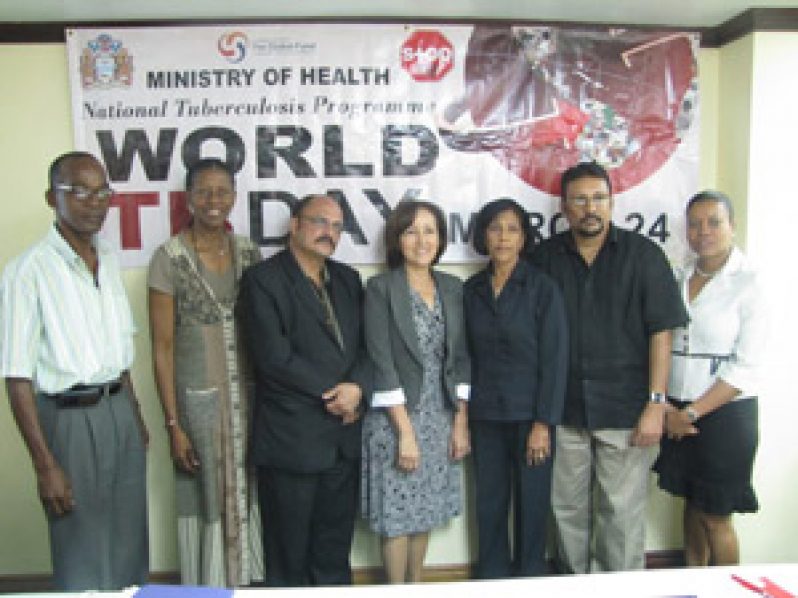MANAGER of the National Tuberculosis Programme in Guyana, Dr. Jeetendra Mohanlall, has disclosed that tuberculosis (TB) awareness efforts at the community level have intensified over the past two years.
 In an interview yesterday with the Guyana Chronicle, Dr. Mohanlall said that they have been working with organisations such as the Clerical and Commercial Workers Union (CCWU) and the International Labour Organisation (ILO) in an effort to intensify awareness efforts in the workplace.
In an interview yesterday with the Guyana Chronicle, Dr. Mohanlall said that they have been working with organisations such as the Clerical and Commercial Workers Union (CCWU) and the International Labour Organisation (ILO) in an effort to intensify awareness efforts in the workplace.
According to him, they have also done a lot of work with the Guyana Red Cross Society (GRCS) and the Guyana Chest Society (GCS), with the latter producing posters and a booklet to address stigma and discrimination.
He further stated that they have also done awareness work with schools, through the Ministry of Education, as well as faith-based organisations.
Dr. Mohanlall indicated that while there is easy access to the coastland areas, it is more difficult to reach persons in the hinterland,and so there are persons who visit these communities to do sensitisation work and there are also development support groups.
He stated that persons living with TB need support and encouragement from their peers and family members to complete their treatment.
According to him, those TB-positive persons in hinterland areas have free access to all TB services from diagnosis to treatment, as is the case with all the other regions of the country.
He said that there remains an issue of stigma and discrimination, noting that from time to time there have also been reports of health workers discriminating against TB patients.
Dr. Mohanlall said they’re very intolerant of this, and therefore they try to deal with such issues in a professional manner.
He indicated that due to the fact that the disease is airborne, persons may have concerns, and they need to be educated on an ongoing basis.
CURABLE AND PREVENTABLE
He related that the disease is curable and preventable, and if a person is exposed to someone who has TB, they can be screened and given medication that prevents them from contracting the disease.
Dr. Mohanlall said the TB-HIV (Human Immunodeficiency Virus) co-infection remains a burning issue, and they have been working closely with the National AIDS Programme Secretariat (NAPS) to address this.
According to him, out of the 721 reported cases of TB last year, 29% were TB- HIV co-infections, representing a rise in the number of co-infections; in 2011 there were 693 cases, with 23% being co-infections.
He indicated that they have been collaborating with NAPS over the years, including a lot of work with their strategy, and securing funding dedicated to TB-HIV co-infection.
Dr. Mohanlall said that patients also need to take responsibility by taking their medication seriously, noting that persons with TB-HIV co-infections tend to default easily, and in some instances they do not cooperate with health workers.
TB is an infectious disease which is caused by Mycobacterium Tuberculosis, and is contracted when a person with active TB coughs, speaks, laughs, sings or sneezes as the TB bacterium gest into the air and can spread from person to person.
TB usually affects the lungs but can affect other parts of the body as well.
TB and HIV form a lethal combination, each speeding the other’s progress, as when HIV infection weakens the immune system, a person is more at risk to develop TB disease if exposed to the TB bacterium.
According to the World Health Organisation (WHO) 2012 TB report, progress towards global targets for reductions in TB cases and deaths continues, as the Millennium Development Goal (MDG) target to halt and reverse the TB epidemic by 2015 has already been achieved.
The report stated that mortality and incidence rates are falling in all of WHO’s six regions and in most of the 22 high-burden countries that account for over 80% of the world’s TB cases.
In 2011, there were an estimated 8.7 million new cases of TB (13% co-infected with HIV) and 1.4 million people died from TB, including almost one million deaths among HIV-negative individuals and 430,000 among people who were HIV-positive.
TB is one of the top killers of women globally, with 300,000 deaths among HIV-negative women and 200,000 deaths among HIV-positive women in 2011.



.jpg)










